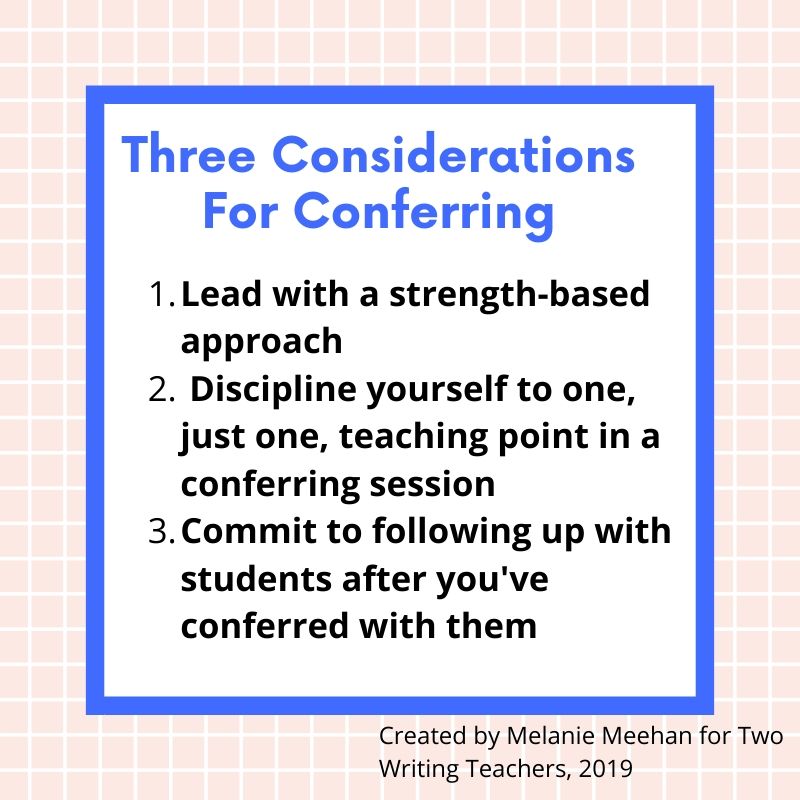
At the beginning of coaching cycles, many teachers express interest in how to improve their conferring skills. I’ve been trying to improve my own skills as I sit down next to writers throughout my years of teaching writing, and there is so much more to conferring than the three ideas I’m sharing in this post. There’s the art of listening, of leaning in, of projecting positivity and you-can-do-it-ness (a new word). There’s also the challenge of reading writing quickly, knowing what’s going well, and recognizing some possible high-leverage next steps. And then there’s the daunting quest of having tools ready to go for any lesson you want to give on the spot. This post does not provide all of this– just three quick concepts that might help you do what you’re already doing well… maybe a little better.
- Lead with a strength-based approach
Until recently, I have begun most conferences with students by sitting down next to them and asking the Carl Anderson-inspired question, “How’s it going?” I still love that question. However, since reading Katie Cunningham’s newest book, Start With Joy, I have begun conferences with student writers with slightly different words but very different meaning: “What’s going well?”
Students have seemed surprised to be asked this question, but it immediately sparks a writerly conversation. I’ve had students explain their process of building their character, their pride in knowing the sections and clear reasons of their essay, and of course, the attention they might be paying to some aspect of conventions.
I follow up with a question along the lines of “What’s challenging you?” or “What’s feeling hard?” Students are much more apt to identify a possible teaching point. Of course the caveat is that a student might say something that I have no idea how to teach, in which case, I have the option to admit my uncertainty with a commitment to get back to that student as soon as possible.
2. Discipline yourself to one, just one, teaching point in a conferring session
We all have had the experience of sitting down next to a student, reading their writing, and seeing ten–no, eleven– no, twenty– (maybe I’m exaggerating…) potential teaching points. Resist the urge to teach more than one, and ideally, enlist the student to be a part of the decision-making about what that focus will be. There’s time. Less is more. We all have our cognitive capacity. Let your students focus on one challenging thing to work on at a time within the work they’re already doing as they write. Make sure the student knows what the teaching point is and can even say it in their own words. Learners have to know what they’re working on if they’re going to work on it. I try to always ask, “What did I teach you?”, and it’s fascinating to listen to the responses. I can learn a lot about my own teaching when I ask this question.
With good record-keeping, you can pay attention to the changes that hopefully happen in your student’s writing. Once that new thing feels more comfortable, you can circle back with another, and your teaching will be much stickier, and stickiness is a really good thing. Success builds success, and as students feel more competent, they’ll be more open to additional challenges, which leads to number three.
3. Commit to following up with students after you’ve conferred with them.
Many times, we work with students, and we provide a really great conference, and we think we’ll absolutely remember it, and the rest of the day happens, and we forget who we taught and what we taught. There are many ideas and options out there for recording systems, and these systems can help you with the all-important task of circling back to students. Students will learn that once you teach something, you’ll be looking for it, or students will learn that once you teach something, you’ll forget about it. I don’t think I need to say more about that…
Done well, conferring will grow learners more than any other practice. Maybe this is why there are so many books, so many posts, and even so many institutes are dedicated to conferring with writers.
In the spirit of three, here are three Two Writing Teachers posts to read for more about conferring, but please know there are many, many more resources about this subject:
Stacey interviews and shares high-leverage tips and ideas from Carl Anderson. Carl has written several books about writing conferences.
Beth writes about four methods for conferring. Like so many aspects of teaching, there are choices in how we approach it, and Beth’s post is super clear about some of the options for writing conferences.
Lanny has lots of great tips about all aspects of conferring. His post contains many additional resources to explore as well.


This post has me thinking of ways to ensure that I follow up on the conversation. There are always distractions or other tasks that “need to get done”, but our committment first and foremost is to the student and growing them in their writing and reading lives.
LikeLike
I adore the question “What’s going well?” (I might add “What’s going well AS A WRITER?” at the beginning of the year just to get kids used to the fact that the question is about writing. But that’s just me.) That’s an immediate way to make sure the convo begins on a positive note.
LikeLiked by 1 person
While it seems so obvious, I often forget to approach from a strength. My students tend to be strong writers, yet I need to remind myself that all writers need to know where their strengths are. I am working on giving more specific feedback, such as “I like the way you wove a music metaphor into your poem.” rather than “Wow! What a great poem.”
LikeLiked by 1 person